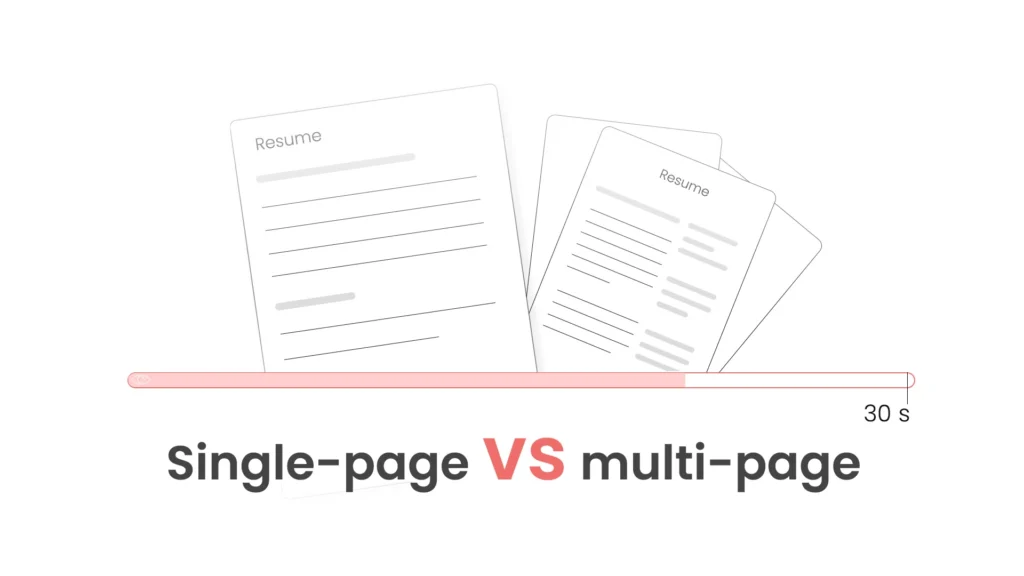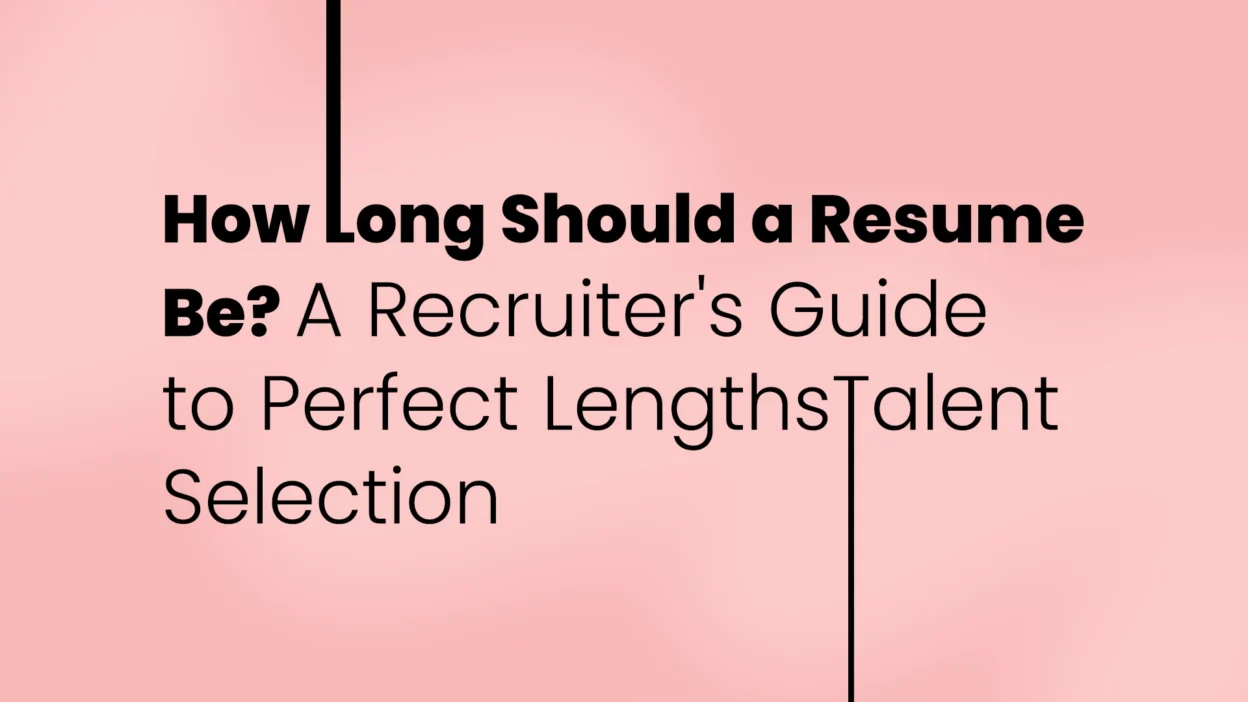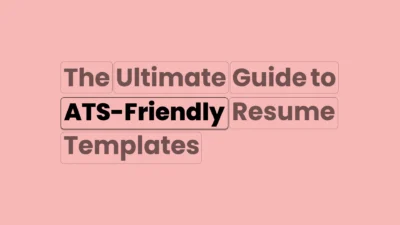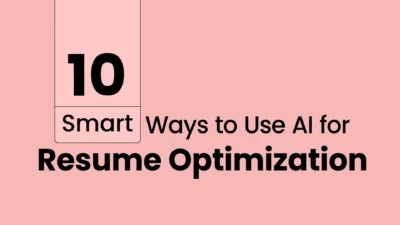For a long period, there has been a controversy about how long should a resume be. To be honest, the Ideal resume length for job applications depends on many factors, such as your level of professionalism and your field of work.
The ideal length will depend on your effectiveness in presenting your most important experiences. What one aims for is to make it concise, organized, and simple enough for recruiters to scan through and understand your strengths at a glance.
You never seem like a professional in your field with a 1-page resume, and on the other hand, no junior-level work applicant has a 3-4 page resume.
So, continue reading this blog post if you are confused, because you are going to find really great pieces of advice later on in this post.
Table of Contents
What is a 30-Second Rule for a Resume?
How long do you think a recruiter would look at your resume before choosing you for an interview?
Not a lot! Recruiters spend an average of 30 seconds or less reviewing a resume before deciding whether to move forward with a candidate. This is why resume length matters! Your most important qualifications should be visible at a glance. If your resume is too long or cluttered, key details may be overlooked. These are some tips that might help you survive in the first 30 seconds:
- Life-saving bullet points: Use clear headings and bullet points for easy readability. Nobody is going to read long blocks of words.You can talk about the details in the interview.
- Keep it relevant: Highlight your most relevant skills and experience at the top. You do not need to mention all your experience.
- Avoid being so into details: Is the devil really in the detail? Not here! Do not mention unnecessary details and outdated work experience.
- Tailor your resume: Are you applying for a Front-end developer role? You do not need to talk about your experience in content writing. Match the resume to the specific job you’re applying for.
Read More: Essential Soft Skills for Resume
Choosing the Right Resume Length: 4 Key Factors
No matter where you are in your career, your resume length should always feel intentional, not bloated or bare. Here’s what to keep in mind:
1. Relevance Over Volume
Include only what supports your target role. Remove outdated roles, unrelated side gigs, or repetitive job descriptions. If it doesn’t help you get the job, leave it out.
2. Concise Language
Use tight, focused sentences and bulleted lists. Avoid filler phrases like “responsible for” or “duties included.” Instead, start with strong action verbs and get straight to the point.
3. Easy to Scan
Structure your resume length with clear headings, bullet points, and white space. Recruiters should be able to skim and still understand your story in seconds.
4. Know Your Industry’s Norms
In tech, finance, or marketing, concise resumes are expected. In law, academia, or medical fields, multi-page CVs are more acceptable. Always align with the expectations of the field you’re applying to.
Single-Page or Multi-Page Resumes? How long should a resume be?

The quick answer is: it depends!
A single-page resume will work for students, new graduates, and professionals with less than 3 years of work experience. It will force candidates to prioritize information, and recruiters can scan through them with ease. Maintaining a single page will, in fact, exhibit your effectiveness in prioritizing information. You don’t know how to gather all the information in one page? Continue reading.
A multi-page resume, on the other hand, will work for professionals with a long work background, technical expertise, and leadership experiences. Standard resume length for professionals, such as academia, research, and senior management, will demand a long resume in showcasing publications, work, and executive experiences. In case one decides to use a two-page resume, make sure that each section adds value and does not complicate reading.
📄 One-Page Resume: When Less Is More
Who it’s best for:
- Students or recent grads
- Early-career professionals
- Career changers with limited relevant experience
A one-page resume is perfect when you’re still building your career. It forces you to focus on the essentials: your education, internships, relevant projects, part-time jobs, or transferable skills. Think of it as a quick snapshot that packs a punch without overwhelming the reader.
Bonus tip: A short, strong resume length often makes a better first impression than a cluttered two-page document with filler content.
📄📄 Two-Page Resume: Room to Grow
Who it’s best for:
- Mid-career professionals (7–15 years of experience)
- Those with a mix of roles, promotions, or leadership positions
- Professionals in technical or project-heavy industries
If you’ve been working for a decade or more, or you’re applying for roles where your breadth of experience truly matters, a two-page resume length is appropriate. Just make sure both pages are equally strong; page two should never be an afterthought.
Pro tip: Use the second page to expand on measurable accomplishments, leadership examples, or certifications that give you a competitive edge.
📄📄📄 Three Pages or More: Proceed with Caution
Who it’s for (in rare cases):
- Academics with research publications
- Medical professionals with fellowships and clinical history
- Senior executives or consultants with long, multi-industry careers
For most job seekers, a resume longer than two pages isn’t necessary and could even work against you. Recruiters typically spend just 6–8 seconds on a first scan, so they only go past two pages if your industry demands it and every section is truly relevant.
Read More: How to name resume file
Common Mistakes to Avoid with Resume Length
Many job seekers struggle to find the right balance between too much and too little information. You don’t want to be among them? Here are some common mistakes to avoid:
- Including irrelevant work experience: Only list jobs and achievements that relate to the position you’re applying for. Note that if you are not experienced enough, then add all your work experience that might support your claims on having certain soft skills.
- Using long paragraphs: Break up information into bullet points to make your resume readable. Don’t forget the golden time (30 seconds). You don’t want to miss it.
- Failing to update your resume: Ensure your resume reflects your most recent and relevant experience with Resume Checker. Don’t forget to check the links on your resume to see if they are updated and still reflect what you want.
- Overloading with unnecessary details: Avoid listing outdated skills, jobs from decades ago, or excessive personal details. You can always talk about your other experiences in an interview, but now you just need to get there.
Unlock a faster, more efficient hiring process today with our powerful Resume Parser – streamline your recruitment and get the insights you need instantly!
Magical Resume Parser
Discover the powerful capabilities of the Magical Resume Parser and explore the various options available to streamline your hiring process, optimize candidate selection, and enhance recruitment efficiency.
How to Keep Your Resume Short and Strong
Even experienced professionals often fall into the trap of overexplaining. Here are ways to trim the fat while keeping your impact intact:
Prioritize What Matters
List only the most relevant roles and accomplishments. Skip old or minor positions unless they directly support your current goals.
Use Action Verbs
Start bullet points with dynamic verbs like “led,” “developed,” “increased,” or “streamlined” to keep your resume active and achievement-driven.
Quantify Your Wins
Use numbers wherever you can. “Improved customer retention by 25%” speaks louder than “Helped retain customers.”
Eliminate Redundancies
Don’t repeat similar tasks under multiple jobs. Group them or reword to avoid duplication.
Tailor for Each Job
Don’t use the same resume for every job. Instead, tweak it slightly based on the job description. Keep a master resume, and trim it to match each role.
Resume Formatting Tips to Maximize Space
Sometimes you try your best to shorten your resume, but you can not manage the whole text in 1-2 pages. If you’re struggling to fit your resume within the ideal length, consider these formatting tips:
- Make sure the text is not too big or too small. Use clear, professional fonts like Arial or Calibri in size 10-12 to maintain readability.
- Adjust margins to a reasonable size (between 0.5 to 1 inch) to make the most of your space.
- Utilize white space effectively to prevent overcrowding and make sections easy to distinguish.
- Remove filler words and unnecessary descriptions to keep your content concise and impactful.
What Recruiters Want
Recruiters don’t care how long your resume is—they care how fast they can see you’re a fit. That means:
- Clear, relevant information up top
- Job titles and companies that match the industry
- Easy-to-read formatting
- Proof of results, not just responsibilities
Whether it’s one page or two, the content needs to deliver value fast. A two-page resume with vague content won’t beat a focused one-pager that clearly shows impact.
Conclusion About Ideal resume length for job applications
Resume length isn’t a one-size-fits-all problem, but ideally, it will be kept at a minimum and yet effectively convey your skills and experiences. Regardless of whether your resume is one or two pages, make it concise, relevant, and specific to your target position. Elevate your business with MagicalAPI.
Forget the myth that your resume must be exactly one page. Let the job you’re applying for, and your level of experience determine the length. Here’s a quick recap:
- One page is ideal for early-career professionals or simple job histories.
- Two pages work well for experienced candidates, project-heavy roles, or technical fields.
- More than two pages is rare and usually reserved for very specialized careers.
Still unsure if your resume is the right length? Try a free Resume Checker to scan for issues with length, structure, or keyword match. It’s a fast way to get unbiased feedback and make smart edits before sending it out.
In the end, your resume isn’t just a list of jobs; it’s a marketing tool. Make sure it’s the right size to tell your story and land the interview.
FAQs About Resume Length
1. Can a resume ever be over two pages?
In most cases, two will do. Academics, medical professionals, and researchers, however, utilize lengthy CVs with lists of publication, conference attendance, and work on projects.
2. What happens when I have too much for one but not enough for two?
If in between, try cutting out unnecessary information. You can make minor format adjustments, such as reducing your margin and/or your font (but not at the expense of readability), in an attempt to make your resume fit onto one page.
3. Do I include all my work experiences?
Include only relevant work experiences. Employments a decade in your past may not be worth including unless closely relevant to your current career path.
4. Do recruiters have a preferred resume length?
Recruiters appreciate a concise, well-presented resume. What is important isn’t necessarily its length but its effectiveness in communicating your qualifications.
5. Is a one-page resume too short for experienced professionals?
Not necessarily. If you can showcase your expertise effectively within one page, that’s perfectly fine. The key is to highlight achievements rather than listing every detail of your work history.
6. How do I know if my resume is too long? how long should a resume be?
If your resume includes redundant details, outdated experience, or excessive personal information, it might be too long. Always review and edit to ensure everything included adds value to your application.
7. Can I adjust the font size and margins to fit more content?
Yes, but be careful not to sacrifice readability. Stick to professional font sizes (10-12 pt) and reasonable margins (0.5 to 1 inch) to keep your resume clean and legible.





